If you have ever been in the market for a new apartment in Japan, you have probably noticed all the agencies are closed on Wednesday. Maybe you thought nothing of it, but it is a real estate industry standard based on a superstition. Today we will look at the origin of this superstition, other explanations for this, and the implication of this on customers and people in the industry.
Contracts flow in the water
In the Japanese language, the word for Wednesday is “suiyoubi” (水曜日). The first character in this word is the Kanji for water (水). Because of this, it became a superstition that any contract made on a Wednesday would flow in the water and not go through.
Since the contracts made in the real estate industry tend to be dealing with large sums of money, it was deemed too risky to do business on Wednesday. Having all the work and time invested into a deal be washed away because you foolishly decided to do business on a watery Wednesday is simply impractical. Therefore it has become a real estate industry standard not to do business on Wednesday.
Being available for business
Now that we have discussed the superstitious roots, we can move on to more practical reasons.
Typically people in the market for a house or apartment have a job, and that job usually requires them to work 5 days a week. Jobs in Japan, like most of the world, tend to have Saturday and Sunday off. To accommodate this, real estate agencies like to have available hours on the weekend.
With the weekend being free game for work hours, they pull days off from weekdays. Wednesday tends to be a staple for days off due to the tradition highlighted above. So common work weeks usually come in the form of Wednesday and Sunday off, Wednesday and Tuesday off, and even Wednesday plus one other day of your choice off.
Due to this standard being set in the real estate industry, related industries like property management tend to also follow this custom. If all your business partners take Wednesday off, you would not be able to get much work done on Wednesday anyway, so the effect compounds.
So beyond just a superstition, having a set weekday off for an entire industry seems pretty practical.
Pros and Cons of this schedule
Beyond the reasoning for this schedule, we should look at how it affects everyone involved.
From a customer standpoint, unless you specifically have Wednesday off, it probably doesn’t affect you much. It just means you can schedule apartment tours and meetings with an agent on the weekend when you are off work.
For people in the industry, it is a bit more complicated.
The main benefit is being able to do things on weekdays when other people are working. Such as scheduling appointments at government facilities and banks without having to take work off, since they are only open during weekdays. As well as being able to enjoy attractions without them being overly crowded.
In terms of negatives, it is mainly not having the same work schedule as friends and family. Events such as weddings or festivals tend to cater to people with weekends off, making it hard for people with irregular schedules to attend. This could potentially cause a strain on interpersonal relationships and is definitely something to consider.
Conclusion
Japan has many traditions with unexpected origins. It is interesting to look at how a superstition can shape how a whole industry works, and how the people in the industry live their lives.

